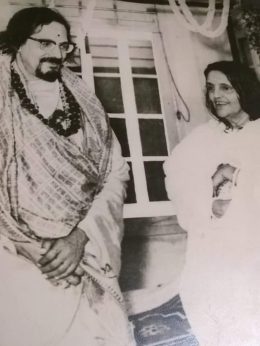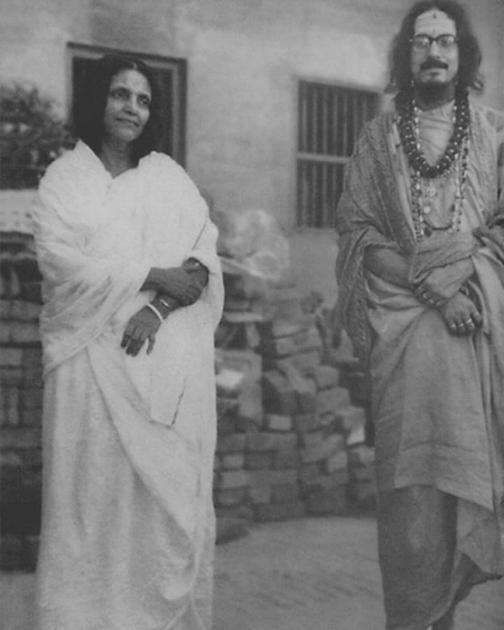Paramahansa YoganandaMahatma Gandhi Swami ChidanandaJ. Krishnamurti
The Mother of PondicherrySwami RamdasSwami SivanandaDaya Mata
Sri Mohanananda Brahmachari

Mohanananda Brahmachari
Sri Mohanananda Brahmachari (17 December 1903 – 29 August 1999) was a was the second Mahant (Head) of the Ram Niwas Brahmacharya Ashram. He also created a number of trusts, social service foundations, hospitals, medical centres, and schools under his Guru’s name, Guru Sri Sri Balananda Brahmachari. When he was in his 2nd year at the Scottish Church College, Calcutta he left and went straight to Deoghar Ashram and joined the order in 1921, at the age of just 17. Seeing his determination, dedication and devotion to the monastic life, Sri Sri Balananda Maharaj gave him permission to staying at the Ashram. After only 21 days he was given Naisthik Brahmacharya diksha and was renamed by Sri Sri Balananda Maharaj as “Mohanananda”.He engaged himself only for ‘japa’,’ yoga ‘,’Dhyan’ and other rituals and as an ideal disciple of his Guru. Maharajji moved from one place to another, from the palace of the rich to the cottage of the poor and blessed them with divine happiness with his joyful presence, moral teachings and unworldly kirtan.
The following is taken from an interview with Sw Nirvanananda (later President of the Sangha) recorded by Sw Nityananda in 2001.
“I lived in Kali Mandir (Simla), where Mohanananda came. He lived with a Brahmachari in Deoghar and he left everything and walked out. He came with only one bag, I didn’t know anything or who he was; from the beginning I was a sceptic, so I didn’t know any sadhus or saints. He was so beautiful, he was so attractive, he was sweetly spoken, talked with such love, and he had the attitude I was looking for – he was my ideal. So good looking, so nicely spoken, when he left the room…the smell of perfume, had a small red line on his forehead – so beautiful. Having bhasma (ash), or matted locks – I don’t like all these things. I saw that if there should be a sadhu, he should be like him. A sadhu must be like this. He lived in the room next to me, and until 10 o’clock, he would perform the sacrificial ritual (houm), after which he would apply his small tika and would then talk to us, and we would all talk to him.
That was my time…he told what he said to Ma…Ma used to talk to him inquiring ‘What bhajan do you do, how do you do it’ Whilst talking to him, I said ‘I’ll go to Ma, Ma came here, and She has asked me to go’ He asked ‘Are you going?’ I said ‘Yes yes, I’ll go, because I know Ma’ but he was aware of the fact that he is a Mahant; he cannot go like that, because he has to inform others before that he is coming’ as he would have to be formally welcomed. So he said ‘I have an idea. Send a telegram’ I sent the telegram, and straight away news arrived – ‘come immediately, welcome’. He used to read the Bhagvad…he had a kartal made of silver…a kartal made of gold and he used to do kirtan. He was educated, and – after all – he was a Mahant; he was well known amongst people, he used to teach the Bhagvad very well. People stopped him from going; I said ‘no, Ma has instructed me to go on Jhulan Ekadashi, because Jhulan starts on Ekadashi (11th day from New Moon) so I’ll have to go’ but he didn’t come, he stayed behind.
As soon as I arrived in Brindavan…we used to go to Ma; people come to Ma family-wise; people that come to Ma with their Father and their Mother, and the majority of them are ladies. I didn’t have a mother, and my father was not very interested in these things, he was a working man. Generally women are more attracted to these sorts of things…more towards Bhakti. Nobody even asked, or paid much attention, but we were happy within ourselves; we would go to Ma, Ma is there, and I would enjoy mixing with other devotees, enjoying the atmosphere, an atmosphere of sheer joy. I was not known because I wasn’t exactly a dignitary, but when we went to Mohanananda, I became a VVIP. Everyone was calling me, ‘Ma is calling you, Ma is calling you, Ma is calling you’ I became exempt from all four directions (everywhere). How did I become so important, and why? As Mohanananda arrives, I will have to serve him. As he comes, I will have to take care of him, and how Ma will win over me…I am a very Tip-top man, all minute things have to be put in their places; the tape should be put properly, not here or there; I don’t like carelessness.
When a man comes to the Ashram, what could he possibly need? When he arrives, he would need water for a bath, so it is placed there; where will he bathe – everything is placed for him to bathe properly; after he has bathed, where will he put his clothes to dry? – so a washing line is placed; where will he sit and do his puja? – so everything is catered for; where will he cook? The charcoal, 4-5 are placed and the charcoal is broken –not large pieces – small pieces are put inside, and underneath a piece of paper is left – with matches. One should not have to look for things, everything should be absolutely perfect. Where will we eat, where – will we rest, where will we do puja, where will we meet people – after all he is a Mahant – where will he do his recitation of slokas? Seeing all this I was very happy. And so he came, and as soon as he did, my importance increased. Didi also came, and everyone asked ‘how did this happen?’ But in the end, Ma said ‘Look, these people do not eat food cooked by other people, they live very purely;’ but ultimately he didn’t cook for himself, and I lost my importance. We stayed for a few days, and we came back, and Ma left in the car. Then Mohanananda came to our Calcutta ashram. All of Calcutta’s big elite, all big people, described as being those with ‘blue blood,’ all the traditionally rich people, they are all his disciples. They all came to him in Calcutta, used to come and meet and greet him; later they found out that he was in Anandamayi Ashram, and they all came to see him.”

